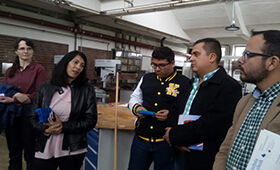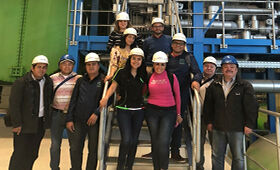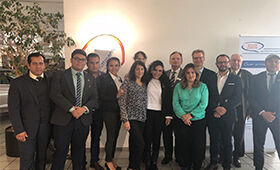Dual vocational education and training – how is it done?
Dual VET – how do companies and vocational schools do it? The delegation from the Mexican BIBB partner institute CONALEP came with many questions about how dual VET is implemented. Over four days they had the chance to pose these questions to practitioners and to visit training centres.

During their European tour, the eight-strong delegation from the BIBB partner institute Colegio Nacional de Educación Profesional Técnica (CONALEP), from the Mexican state of Aguascalientes, and the head of the international department at CONALEP’s main office in Metepec, visited companies and training institutions in the Bonn/Rhein-Sieg region over a four-day period.
The delegation was interested in the practical implementation of dual vocational and educational training, particularly in the areas of mechatronics and renewable energies: How does company-based training work? Why are companies even prepared to invest in training in the first place? How is vocational school teaching planned with a practical focus? What does the collaboration between companies, inter-company vocational training centres and vocational schools look like in practice? Why do young people opt for vocational training in the dual system?
These were just some of the many questions addressed by Mr Koch, Managing Director of Autohaus Schiffmann GmbH (Bonn), Mr Frank, Operations Manager with responsibility for training, and sales advisor Mr Sabino. During a tour, the delegation also had the opportunity to visit training centres and to talk to trainees from the area of automotive mechatronics.
As part of a visit to Energie- und Wasserversorgung Bonn/Rhein-Sieg GmbH in Bonn, the delegation was able to ask Mr Diller about the implementation of dual VET in the area of renewable energies. There was a focus on the generation of environmentally-friendly electricity and district heating.
The Colegio Nacional de Educación Profesional Técnica (CONALEP) was established in 1978. It is represented in 308 schools nationwide. These provide training for more than 75% of all the vocational students in Mexico. CONALEP’s training provision concerns only secondary level II and comprises 48 different training courses.

At the Georg Kerschensteiner vocational school in Troisdorf, the delegation was accompanied by Ms Lackmann and Mr Sandbrink, heads of Health, Social Affairs and Personal Care, and of the School of Technology and Plastics Occupations respectively, as they visited the specialist rooms used for dual VET. The delegation was also impressed by the progression opportunities from dual qualifications into ongoing professional development.
“The practical insight is very helpful for our work. We have gained many ideas, and we believe we can introduce these into our Mexican model of dual vocational education and training (MMFD). We are very grateful to all those involved for taking the time to provide us with such an in-depth insight,” commented Patricia Guadarrama (CONALEP).
In addition to visiting Bonn in Germany, the delegation – which comprised management level representatives, a trainer and a trainee – also visited Finland to find out about the training of vocational school teachers, and Spain to look at the issue of mobility in training.
The MMFD is scheduled for implementation in Aguascalientes. The delegation wanted to use their European tour to learn about in depth and at first-hand about various aspects relating to vocational education and training in order to advance implementation of the MMFD. The BIBB organised presentations and visits to support this.
Successful VET collaboration over many years

CONALEP has been a partner institute of the BIBB since 2009. The BIBB provided specialist support with establishing the legal framework for Mexican (dual) vocational education and training. The MMFD has now been implemented in 24 of the 32 Mexican states.
Together with other German stakeholders involved in VET collaboration, the BIBB worked with CONALEP to develop dual training courses based on the German training system.
When the bilateral working group was formed in June 2015 as part of the German-Mexican VET collaboration, the German Office for International Cooperation in Vocational Education and Training (GOVET) based at the BIBB assumed responsibility for the specialist support in the implementation and ongoing development of the MMFD. The focus of its work involves establishing a Mexican TVET agency, developing standards for the MMFD, and financing models / cost benefit analyses in the MMFD.